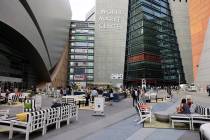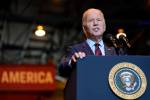Despite necessity of jobs, Las Vegas not mother of invention
Las Vegas created the 99-cent shrimp cocktail, off-site airport baggage check and drive-thru weddings.
Alas, those innovations weren't enough to make the city a serious contender in a Friday report that ranks metro areas by invention and patent activity.
The Brookings Metropolitan Policy Program study, "Patenting Prosperity," gave Las Vegas decent marks for growth in patenting activity. But local invention was limited to a handful of areas, most of which aren't big growth engines of the future. Plus, a deeper look shows Las Vegas lags in important measures of invention activity.
That slow growth matters because of the link between patents and employment, said Jonathan Rothwell, a Brookings associate fellow and lead author on the report. It's a classic ripple effect: Companies invest in research to make new products that generate more revenue. That revenue goes to employee wages and profits that get spent on housing, restaurants, retail and other goods and services. Higher demand spurs hiring among local businesses.
In some ways, Las Vegas impressed. It ranked No. 7 for patent growth from 1990 to 2010, posting an annual average increase of 7.20 percent. That edged out 7 percent in San Francisco and 6.5 percent in Tucson, Ariz.
One company, slot maker International Game Technology, had nearly 16 percent of the market in 2011, with 71 patents. Meyer Intellectual Properties, which makes equipment to prepare food and drinks, ranked second, at 5.7 percent. Other companies filing patents included recording and communications equipment maker Monster Cable Products, slot maker Bally Gaming and computer giant IBM, which in the last decade bought Tririga, a local maker of hotel-management software, and Systems Research & Development, a designer of software that tracks casino cheats and terrorists.
For initial public offerings from 2000 to 2006, Las Vegas also did well, placing ninth with a total IPO value of $20.1 billion. That bested San Diego, Dallas, Seattle, Denver, Philadelphia and Houston.
Patent and IPO figures look less impressive in context, though. One of the reasons patent growth jumped was because the city's invention base was so small to start with.
"Las Vegas went from almost no patents in 1990 to something a bit more respectable in 2010," Rothwell said.
And those IPO stats? They're skewed by a couple of huge deals, including the Las Vegas Sands Corp.'s $690 million offering in 2004. Las Vegas had just 10 IPOs from 2000 to 2006, well below 89 offerings each in San Francisco and San Jose, Calif., and 42 in Los Angeles.
Worse still, Las Vegas didn't crack the top 200 in other areas. It ranked No. 215 in patents per 1,000 jobs, and No. 216 in claims per patent. Patents per 1,000 jobs indicate how oriented a workforce is toward inventing, while claims per patent reflect how valuable a patent is. Cities that fail to churn out valuable patents suffer economically in the long run.
"Productivity growth is closely linked to patenting, so if you have an area with a low patents-per-worker measure, chances are productivity is going to be low, average wages are going to be somewhat low and general living standards will be lower," Rothwell said. "Lasting foundations for economic prosperity are generally rooted in ideas and invention."
That said, Las Vegas is dominated by service industries, which aren't known for big productivity strides anyway. Nor do consumer-oriented services create patentable goods the way high tech-oriented industries do. That doesn't mean Las Vegas is intellectually stagnant.
The city's service sector actually gives it an edge over other service-heavy economies, Rothwell said. It's not a closed-loop economic circuit where money recycles between businesses and locals. Rather, tourism lures 40 million visitors a year who leave behind new wealth.
And through shows on the Strip, art and music, Las Vegas does innovate in its own way (though we're sorry to say that 99-cent shrimp cocktail goes for $1.99 these days).
Still, service economies are more vulnerable to downturns, and they simply can't generate the wage and productivity growth of information technology, manufacturing or professional research services, Rothwell said.
Improving the market's ability to invent won't happen overnight. The metro area needs a university with at least one top-rated research program in a major science such as engineering, chemistry or biology, he said. Such programs train future inventors and foster relationships between academia and corporate research and development labs.
"It takes the commitment of leaders at the state and local level, and in some cases, the efforts of great philanthropists and industrialists," Rothwell said.
Contact reporter Jennifer Robison at jrobison@reviewjournal.com or 702-380-4512. Follow @J_Robison1 on Twitter.























